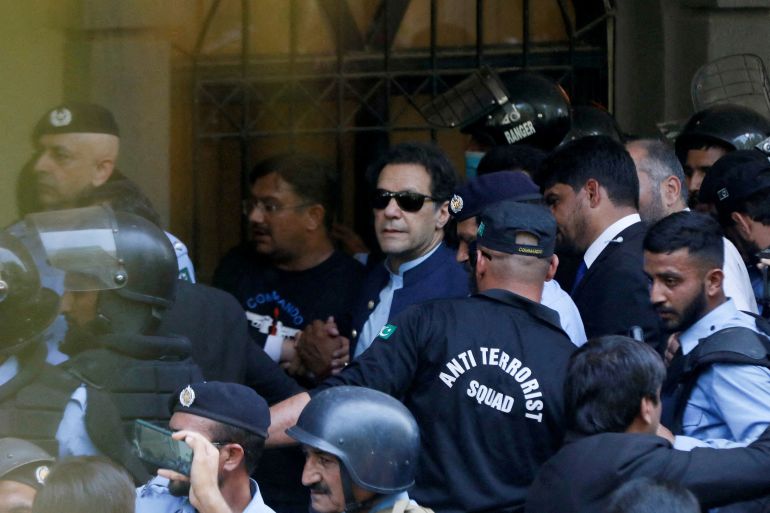Pakistan court rules against ex-PM Imran Khan’s plea to shift case
The rebuff from Islamabad High Court represents the latest legal setback to Khan’s attempts to contest upcoming elections.

Islamabad, Pakistan — A court in Islamabad on Wednesday dismissed the petition from former Pakistan Prime Minister Imran Khan seeking to move a key appeal filed by him to Lahore, marking the latest setback for his attempts to contest upcoming national elections.
Khan has been behind bars since August 5. He was initially convicted for not disclosing assets earned from the sale of gifts from foreign dignitaries meant to be kept in a state depository, and later in a case about revealing state secrets.
Keep reading
list of 4 itemsUS sanctions two RSF commanders as fighting escalates in Sudan’s Darfur
Lawrence Wong sworn in as Singapore’s first new prime minister in 20 years
India’s income inequality widens, should wealth be redistributed?
The case involving gifts led to Pakistan’s election commission disqualifying him from parliament. He had filed an appeal in the Islamabad High Court in October last year against that ban on his participation in electoral politics.
However, in January this year, Khan and his legal team sought to withdraw the appeal from the Islamabad High Court, contending that they have filed a subsequent plea in the Lahore High Court.
In March, before his eventual imprisonment, the Lahore High Court had granted protective bail to Khan in multiple cases.
However, Amer Farooq, the chief justice of the Islamabad High Court, expressed his displeasure over the matter, saying the case should be heard where the appeal was first filed. On Wednesday, the court decided formally that it would not allow Khan to withdraw his petition — though it is yet to deliver its verdict on whether the election commission should lift its ban on Khan’s participation in elections.
Khan and his Pakistan Tehreek-e-Insaf (PTI) political party were in power from August 2018 to April 2022 before he was ousted through a parliamentary vote of no confidence. In August 2022, Khan was accused of buying gifts given by foreign dignitaries from the state gift depository — called the Toshakhana — during his premiership, without disclosing the assets in declarations submitted to the election commission.
Two months later, he was found guilty by the election commission of “corrupt practices”. The verdict meant he was not only disqualified from being a member of the parliament but also declared ineligible to participate in elections.
Subsequently, a trial court, set up for criminal investigation in the same case, declared Khan guilty on August 5 this year, sentencing him to three years in jail. The same day, Khan was arrested from his Lahore residence and shifted to a jail in Attock city in Punjab province.
While the Islamabad High Court suspended the conviction and jail sentence on August 29 and granted him bail, the ex-premier was immediately detained for his involvement in a so-called cypher case, which is related to a diplomatic document that allegedly went missing when it was in the former leader’s possession during his time as prime minister.
Khan is currently imprisoned in Rawalpindi city’s Adiala Jail.
With Khan behind bars, the PTI has seen a raft of its leaders quitting the party following a state crackdown, and last week, Gohar Ali Khan, a lawyer, was elected as the new PTI chief after an intra-party election.
Pakistan, which is mired in a deep political and economic crisis and currently led by an interim setup under caretaker Prime Minister Anwaar-ul-Haq Kakar, is set to hold general elections in February 2024, three months later than originally scheduled.
The country of 241 million people has seen inflation hit record highs, while the security situation has also worsened dramatically in the last year.
Statistics reveal nearly 600 attacks in 11 months took place in the country, an increase of 81 percent from last year during the corresponding period.